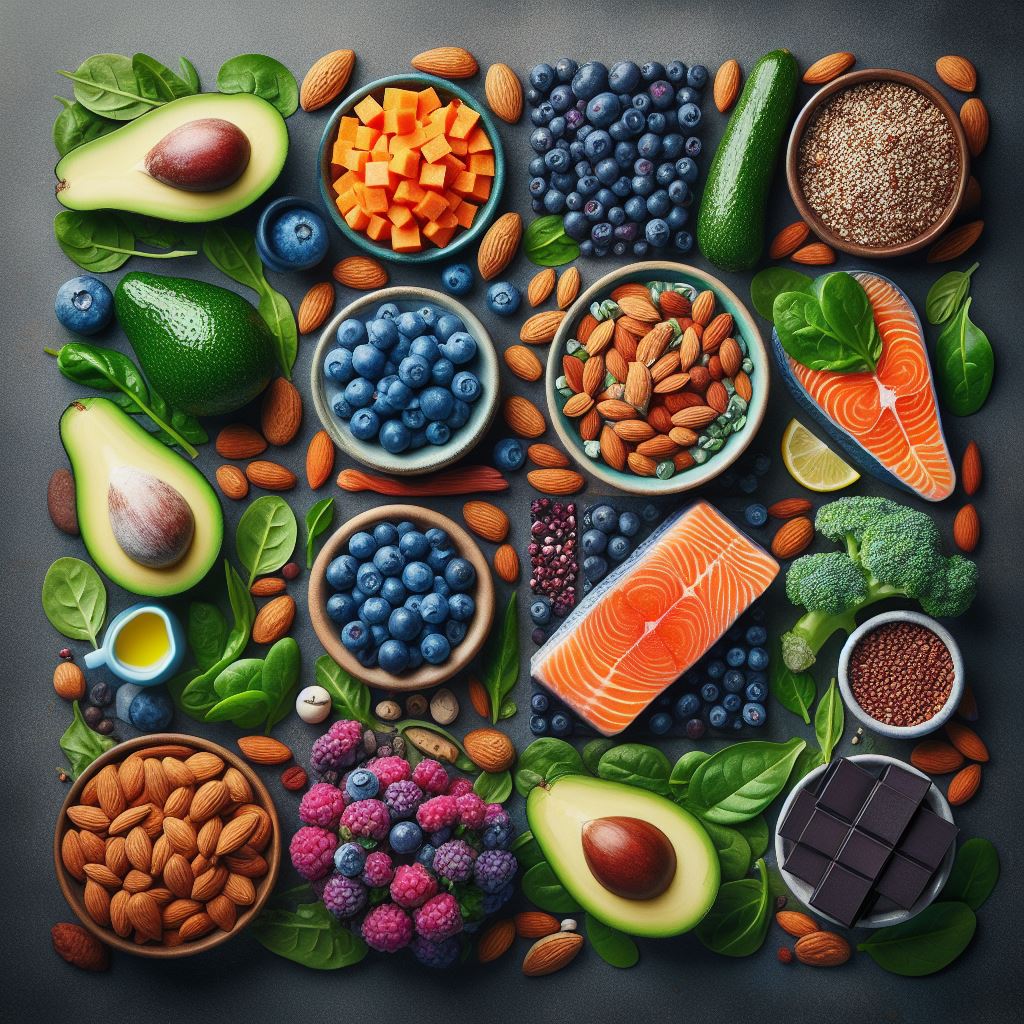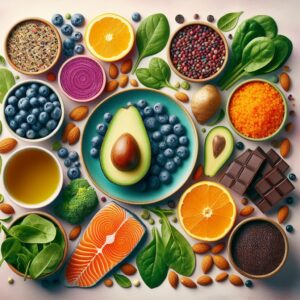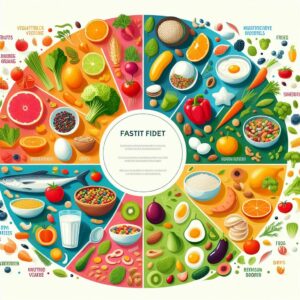
In this blog post, we will introduce you to the 10 best nutritional foods that you can include in your daily meals. These foods are rich in vitamins, minerals, antioxidants, fibre, protein and healthy fats and can help you prevent or manage various health conditions. Let’s get started!
10 Best Nutritional Foods for a Healthy Diet
Eating a balanced and varied diet is one of the best ways to maintain your health and well-being. But with so many food choices available. How do you know which ones are the most nutritious and beneficial for your body? The good news is I’m going to give you the 10 best nutritional
1. Berries In Your Diet
Berries are among the most delicious and colourful fruits that you can enjoy. They are also packed with antioxidants, which are substances that protect your cells from free radical damage and inflammation. Some of the most common types of berries are strawberries, blueberries, raspberries, blackberries and cranberries.
Each of them has its own unique flavour and nutritional profile, but they all share some common benefits. Berries can help you:
- Boost your immune system and fight infections.
- Lower your blood pressure and cholesterol levels.
- Improve your memory and cognitive function.
- Prevent or delay the onset of age-related diseases, such as Alzheimer’s and Parkinson’s.
- Support your eye health and vision.
You can eat berries fresh, frozen, dried or in smoothies, salads, desserts or jams. Aim for at least one cup of berries per day to reap their health benefits. Consuming more than the recommended quantity, does not deliver in additional benefits to your health.

2. Leafy Greens Daily
Leafy greens are the foundation of any healthy diet. They are low in calories, but high in fibre, water and phytochemicals, which are plant compounds that have various health effects.
Some of the most popular leafy greens are spinach, kale, lettuce, arugula, collard greens, and cabbage. They are all rich in vitamins A, C, K and folate, as well as minerals like calcium, iron, magnesium and potassium. Leafy greens can help you:
- Detoxify your body and improve your liver function.
- Reduce your risk of cardiovascular diseases, diabetes and some cancers.
- Strengthen your bones and teeth.
- Promote your skin health and prevent wrinkles.
- Enhance your digestion and prevent constipation.
You can eat leafy greens raw, cooked or in soups, salads, sandwiches, wraps or stir-fries. Try to eat at least two cups of leafy greens per day to get their full benefits.
3. Nuts and Seeds In Moderation
Nuts and seeds are the ultimate snack food. They are crunchy, tasty and satisfying and they can keep you full for a long time. They are also loaded with healthy fats, protein, fibre and various micronutrients, such as vitamin E, selenium, zinc and copper.
Some of the most common nuts and seeds are almonds, walnuts, pistachios, cashews, peanuts, sunflower seeds, pumpkin seeds, chia seeds and flax seeds. Nuts and seeds can help you:
- Lower your cholesterol and triglyceride levels.
- Improve your blood sugar control and insulin sensitivity.
- Protect your brain and nervous system.
- Support your reproductive health and fertility.
- Reduce inflammation and oxidative stress.
You can eat nuts and seeds raw, roasted, salted or unsalted or in granola bars, trail mixes, nut butters or milks. Aim for a handful of nuts and seeds per day, but be mindful of the portion size, as they are high in calories.
4. Eggs Your Protein Fix – 10 Best Nutritional Foods
Eggs are one of the most versatile and nutritious foods that you can eat. They are a complete protein source, meaning that they contain all nine essential amino acids that your body cannot make on its own.
They are also rich in choline, a nutrient that is vital for your brain and liver health. Additionally, eggs contain other important nutrients, such as vitamin B12, riboflavin, iodine and selenium. Eggs can help you:
- Build and repair your muscles and tissues.
- Support your metabolism and energy production.
- Enhance your cognitive function and memory.
- Prevent or treat anaemia and other blood disorders.
- Boost your immune system and prevent infections.
You can eat eggs boiled, scrambled, fried, poached or in omelettes, quiches, muffins or cakes. The recommended intake of eggs is about one to two per day, depending on your individual needs and preferences. If, eggs are your thing, try Quale eggs, they are smaller but contain 4 times the protein level of chicken eggs.
5. Yogurt is A Anytime Fix
Yogurt is a fermented dairy product that is made by adding live bacteria cultures to milk. The bacteria convert the lactose (milk sugar) into lactic acid, which gives yogurt its tangy flavour and thick texture.
Yogurt is a great source of protein, calcium, phosphorus and vitamin B12, as well as probiotics, which are beneficial bacteria that live in your gut. Yogurt can help you:
- Improve your digestive health and prevent or treat diarrhoea, constipation, irritable bowel syndrome and inflammatory bowel disease.
- Strengthen your bones and prevent osteoporosis and fractures.
- Regulate your appetite and weight.
- Support your immune system and fight infections.
- Protect your teeth and gums from cavities and plaque.
You can eat yogurt plain, flavoured or with fruits, nuts, granola or honey. Look for yogurt that has live and active cultures and avoid those that have added sugars, artificial sweeteners or preservatives. Aim for at least one serving of yogurt per day to enjoy its benefits.

6. Salmon A Healthy Source Of Protein
Salmon is one of the most popular and nutritious types of fish that you can eat. It is a fatty fish, meaning that it has a high content of omega-3 fatty acids, which are essential for your heart, brain and eye health. Salmon is also a good source of protein, vitamin D, selenium and iodine. Salmon can help you:
- Lower your blood pressure and cholesterol levels.
- Prevent or reduce the symptoms of depression, anxiety and mood disorders.
- Improve your cognitive function and prevent cognitive decline.
- Protect your vision and prevent age-related macular degeneration.
- Reduce inflammation and joint pain.
You can eat salmon baked, grilled, smoked or in sushi, salads, sandwiches, or soups. Choose wild-caught salmon over farmed salmon, as it has a higher nutritional value and lower risk of contamination. Aim for at least two servings of salmon per week to get its benefits.
7. Oats Keeps You Fuller For Longer
Oats are one of the most nutritious and filling grains that you can eat. They are a whole grain, meaning that they contain all three parts of the grain kernel, the bran, the germ and the endosperm. They are also a good source of soluble fibre, which forms a gel-like substance in your stomach and intestines and can help you:
- Lower your cholesterol and blood sugar levels.
- Improve your bowel movements and prevent constipation.
- Reduce your appetite and calorie intake.
- Stabilize your blood pressure and heart rate.
- Prevent or manage diabetes and metabolic syndrome.
You can eat oats cooked, soaked or in granola, muesli, bars, cookies or breads. Look for oats that are labelled as “rolled”, “steel-cut” or “old-fashioned” and avoid those that are “instant” or “quick-cooking” as they have less fibre and more added sugars. Aim for at least one serving of oats per day to get their benefits.
8. Beans and Lentils
Beans and lentils are among the most affordable and nutritious foods that you can eat. They are legumes, which are plants that have seeds in pods. They are also a great source of plant-based protein, fibre, iron, folate and potassium.
Some of the most common types of beans and lentils are black beans, kidney beans, chickpeas, pinto beans, navy beans and red lentils. Beans and lentils can help you:
- Lower your cholesterol and blood sugar levels.
- Improve your digestive health and prevent or treat diverticulitis, haemorrhoids and colon cancer.
- Support your muscle growth and repair.
- Prevent or treat anaemia and other iron-deficiency disorders.
- Reduce your risk of cardiovascular diseases, diabetes and some cancers.
You can eat beans and lentils cooked, canned or in soups, salads, dips, burgers or curries. Rinse and drain canned beans and lentils before using them, soak and cook dried beans and lentils according to the package directions. Aim for at least one serving of beans and lentils per day to get their benefits.

9. Avocado
Avocado is a unique and delicious fruit that is native to Mexico and Central America. It is also known as a “butter fruit” or an “alligator pear” because of its creamy texture and green skin.
Avocado is a rich source of monounsaturated fats, which are healthy fats that can lower your cholesterol and improve your heart health. Avocado is also a good source of fibre, vitamin K, folate and potassium. Avocado can help you:
- Enhance your absorption of fat-soluble vitamins, such as vitamins A, D, E and K, from other foods.
- Improve your skin health and prevent dryness, wrinkles and acne.
- Support your wound healing and blood clotting.
- Regulate your blood pressure and fluid balance.
- Prevent or treat constipation and haemorrhoids.
There are many ways to enjoy avocados and gain their health benefits. Some of the most common and delicious ways of eating them, such as seasoned with salt, pepper and other spices or herbs. Making guacamole, a creamy dip made with mashed avocados, onion, garlic, cilantro, lime juice and salt.
Adding them to your smoothies, soups or sauces for a rich and creamy texture. Because one avocado contains about 322 calories and 29 grams of fat, which is high. The recommendation is not more than one per day.
10. Dark Chocolate
Dark chocolate is a decadent and delicious treat that can also be good for your health. Dark chocolate is made from cocoa beans, which are rich in flavonoids, which are antioxidants that can protect your cells from damage and inflammation. Dark chocolate is also a good source of iron, magnesium, copper and manganese. Dark chocolate can help you:
- Lower your blood pressure and improve your blood flow.
- Enhance your mood and reduce stress.
- Boost your brain function and concentration.
- Protect your skin from sun damage and aging.
- Satisfy your sweet tooth and prevent overeating.
You can eat dark chocolate plain or with nuts, fruits or coffee. Look for dark chocolate that has at least 70% cocoa content and limit your intake to one or two squares per day, as it is high in calories and fat.
My Conclusion On The 10 Best Nutritional Foods
These are the 10 best nutritional foods that you can include in your healthy diet. They are not only delicious, but also beneficial for your body and mind.
By eating these foods regularly, you can improve your overall health and well-being and prevent or manage various health conditions. Remember to eat a balanced and varied diet and enjoy your food in moderation, you can choose from the 10 best nutritional foods. There’s plenty choice.
Thank you for reading this blog post and I hope you found it useful and informative and shareable. If, you have any questions or comments, please feel free to leave them below. I would love to hear from you.
Ultimate Training Gear.





